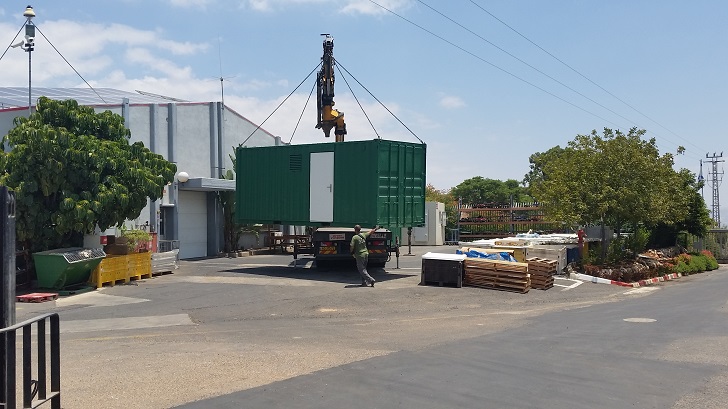
Mobile containerised water filtration plants have been a popular addition to overseas plants and processes for many years. The UK has been slow to pick up on the advantages of this type of plant deployment option but it is now becoming a rapidly increasing trend.
As UK industry wakes up to the fact that water is a limited resource, more and more options regarding source are being considered. Not only does this mean a variation in the water quality but access to the source can test even the most experienced engineer and it may only be a temporary operation. For the municipal water industry especially, the flexibility, manoeuvrability and non-permanent nature of a containerised water filtration plant is very appealing.
A turnkey compact mobile water filtration unit has been seen as an advantage in areas that present access and technical support challenges. These units can vary from complete small scale treatment plants to multiple container systems, each incorporating a stage in the treatment process.
System proven
However, it is not just the provision of mobility that has made these popular with some of the most far reaching utility and industrial plants. The ability to pre-commission and ‘prove’ the system before dispatching effectively reduces installation and maintenance issues as they will only require services connection and process interconnection on arrival at site.
These temporary containers bring with them some considerable cost saving benefits, the most significant relating to civil engineering construction and planning requirements which would become negligible in the scheme of things.
Nevertheless, there is a bespoke aspect to these units in order for them to be best utilised. Firstly, a clear understanding of how the plant will be operated in the field needs to be established, together with an appreciation of the different challenges containerisation presents. Added to the overseas assessment of climate and situation comes the added UK challenge of operational risk and industry specific compliance.
Potentially dangerous
UK water utility companies are bound by legislation to provide domestic homes with water that is considered ‘wholesome’ for drinking, cooking and washing. This means that water must not contain any micro-organisms or a concentration of substances that may be potentially dangerous to human health. Breaches of these limits can ultimately result in boiled water notices being imposed or in worse case situations, bottled water supplies being distributed.
Ultimately, however, it is what lies within the water that is far more alarming. One such parasite, Cryptosporidium, is one of the most important contaminants of which water utility companies need to take control. Commonly known as ‘Crypto’, this parasite causes the diarrheal disease cryptosporidiosis.
Containerised mobile water filtration plants therefore provide an excellent ‘immediate delivery’ solution to water source problems that suddenly contaminate a distribution system. If finances were unlimited, all water treatment plants would have a full array of the barrier options available and probably follow the European trend to have a double barrier in place. However, given the nature and age of some of these water utility assets, outbreaks can still occur. One effective approach is to have mobile units available that can be deployed at short notice to deal with events as they occur and to help safeguard assets awaiting permanent upgrade.
At this point it should be recognised that simply putting a plant in a container and shipping to site is perhaps not be the best solution for plants that are in long term operation. These units are a temporary solution for normal site remedial works to be undertaken, although they can operate on a permanent plant for some time, even up to 12 months.
Careful thought required
Good containerisation requires careful thought. Often, space is at a premium and access is limited. Early discussion with the client regarding maintenance requirements and access ability, typical deployments periods, along with their own policies on these matters requires careful consideration. How much heat will be generated by system pumps and the extremes of ambient temperature also have to be examined.
When it comes to standard maintenance, the space in an open plantroom is of course an important consideration. However, any maintenance that needs to be carried out when working inside what is effectively a box brings with it other issues. It is therefore vital to look at the impact of frequency, turbidity of water and chemical usage at the design stage.
There will be compromises of course. The key to success therefore is in the planning and design stage where a full dialog of needs and operational requirements will prevent the most common mistakes being made.
Special low profile media filter
Amiad has been producing containerised systems for decades. Specialised sections are provided in the roof to enable media to be changed and access ports are provided in walls for critical part removal. Special low profile media filter construction for containerisation are also all part of the manufacturing capabilities; even to the selection of the external paint colour so the container blends in with its temporary environment.
Without a doubt, containerisation is an opportunity for industry to reduce costs, both in terms of utilisation of its own engineering resource and to vastly reduce a project delivery schedule. It keeps all delivery and performance expectations with one supplier and is a true turnkey package that, should the business need to redeploy or expand, becomes a mobile asset. The units can be purchased outright or procured as a contracted package so costs can be spread out over a period of time whilst getting the full benefit of the best technological solution without having to go the capital expenditure route.




